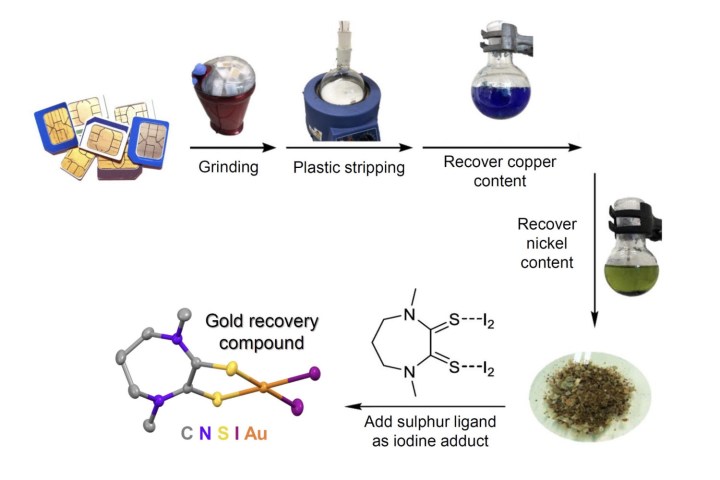Digital devices are a potpourri of dear and uncommon components, however a majority of them find yourself piling up in an e-waste landfill as an alternative of being recycled. That’s not as a result of we lack the tech to recycle it, however attributable to elements like value administration and course of effectivity. SIM playing cards are among the many telephone elements that find yourself going to waste with out a lot uptake when it comes to recycling efforts.
Now, the oldsters over at Imperial School London have devised a way of recycling SIM playing cards that may probably assist make medicines cheaper. In a world the place well being care accessibility is in disaster mode — particularly within the U.S., the place folks pay the best value globally at $1,300 per 12 months on medicines – this encouraging SIM recycling technique focused on the pharmaceutical business might be a godsend.
It’s all about that gold

On the coronary heart of this promising resolution is gold — a gold compound, to place it exactly. SIM playing cards make use of gold coating as a result of it is a superb conductor of electrical energy. Plus, it resists corrosive harm over time a lot better than different valuable metals, akin to silver. The amount used, nevertheless, is sort of small, and you would need to acquire hundreds of SIM playing cards to extract a couple of grams of gold.
That’s not a really economically sound course of, each at a person stage in addition to an industrial scale. The largest downside is the extraction strategies, that are advanced and costly. In response, professors Angela Serpe and Paola Deplano on the College of Cagliari in Italy developed a straightforward technique of recovering gold and different valuable metals from electronics.
So, how does it play into the enterprise of creating medicines? Properly, gold additionally occurs to be a wonderful catalyst, which suggests it might pace up the method of chemical reactions. The method talked about above depends on grinding, plastic stripping, and chemically treating the e-waste to get well gold in a compound kind, which isn’t actually as valuable because the blingy steel itself.

Actually, the gold compound produced on the finish of the method received’t simply yield pure gold for reuse in digital circuit boards. That is the place a couple of minds from Imperial School London got here up with an answer. Led by professors James Wilton-Ely and Chris Braddock, they discovered a approach to make use of this recycled gold compound as a catalyst for pharmaceutical functions.
How all of this works
The staff utilized the gold compound as a catalyst in a number of chemical reactions for making medicines akin to pain-relief and anti inflammatory medicine. To their shock, the gold “waste: at their hand “carried out as nicely, or higher, than the at the moment used catalysts.”
One other main discovery was that this gold compound derived from waste SIM playing cards may be reused, which additional provides to its cost-efficiency enchantment. A analysis paper, which is now accessible in ACS Publications, says, “that is the primary direct software in homogeneous catalysis of gold restoration merchandise sourced from e-waste.”

This low-impact restoration course of for acquiring gold as a catalyst from discarded SIM playing cards and different waste electrical and digital gear isn’t solely extra economical, but additionally way more environmentally sustainable than business mining.
Leftover SIMs = cheaper meds
The paper provides that “even unoptimized, small-scale manufacturing” of the gold catalyst, which is obtained within the type of a black crystalline stable, is considerably cheaper than the standard choices at the moment getting used within the pharmaceutical business. After all, it is usually far much less damaging to the surroundings than gold mining operations.
Even after the gold compounds are used as catalysts throughout a medication synthesis batch, and are recovered utilizing a easy chemical course of, they’re freed from any natural impurities. To place it merely, they can be utilized for catalyzing drugs manufacturing processes as much as eight instances with none loss of their effectiveness.

The staff concludes that standard gold catalysts could be substituted with “extra sustainable and cheaper alternate options recovered from thousands and thousands of metric tons of e-waste at the moment despatched to landfill every year.” With mass adoption, advantages derived from this breakthrough might very nicely be handed to the pharmaceutical business to make medicines extra reasonably priced.
In instances when even the White Home needed to intervene with an govt order to decrease the worth of prescribed drugs, the world might positively use improvements like this one. One other notable mission geared toward recycling SIM playing cards got here from the Children Non-Revenue Group (KNPO), which used recycled SIM playing cards to make security reflectors. The objective was to make use of them to forestall street accidents.
Editors’ Suggestions

